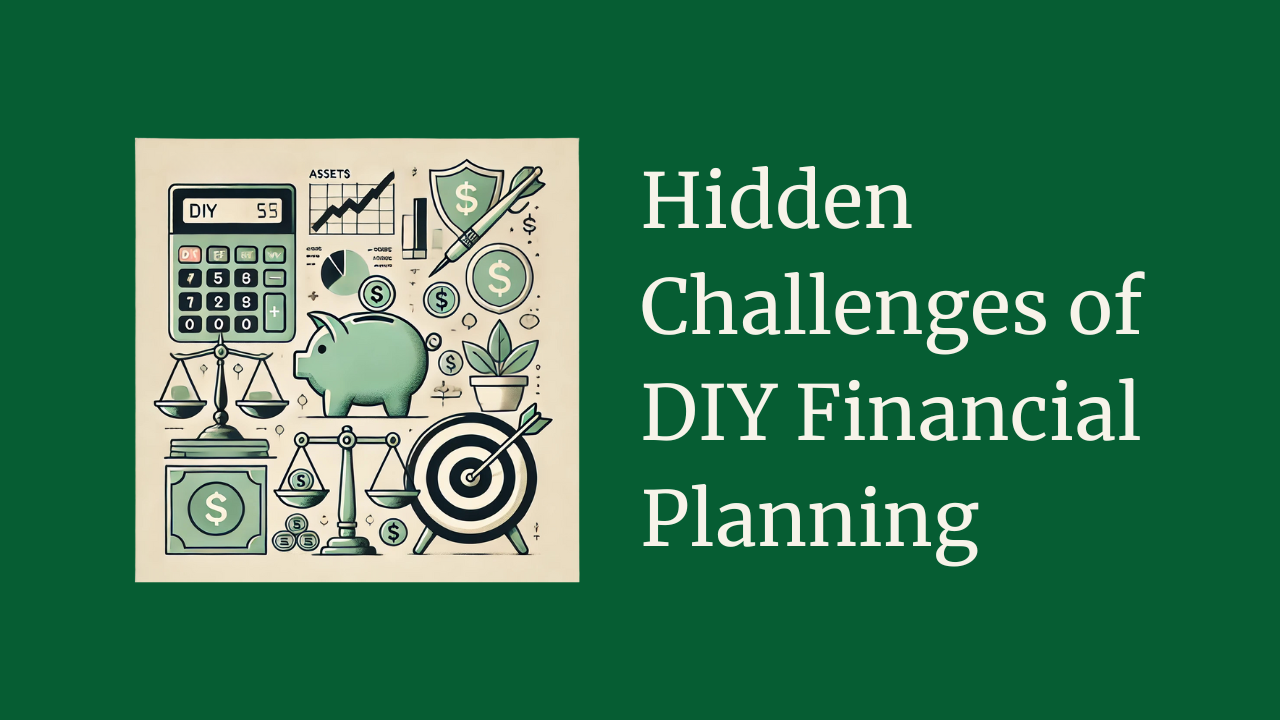Podcast Episode 43
YouTube
Spotify
Article Discussed

Show Notes
DIY Financial Planning: Navigating the Hidden Challenges
Hey everyone, and welcome to Safe Simple Sound online! This page expands on Episode 43 of our podcast, where we dove into the often-overlooked complexities of DIY financial planning, inspired by our LinkedIn Newsletter article, "The Hidden Challenges of DIY Financial Planning," published in "The SECURED Path". Just like our SECURED principles, we'll explore how seizing control, understanding choices, and embracing flexibility are crucial for a secure financial future, whether you're DIYing or seeking guidance.
Overwhelm and the Illusion of Control
This section tackles the common pitfalls of feeling in control while actually being overwhelmed by the sheer volume of financial information available.
The Information Overload Paradox
Sarah, a young professional, dives into online financial research, consuming conflicting advice from various sources. Instead of feeling empowered, she's paralyzed by the information overload, hindering her progress. This highlights the Information Overload Paradox: too much information can be detrimental.
Key takeaways from the podcast:
- Reliable sources are key: Start with government websites, established financial institutions, and credentialed professionals. Be wary of "get-rich-quick" schemes.
- Foundational understanding first: Focus on core concepts like budgeting, saving, and debt management before diving into complex strategies.
- Avoid analysis paralysis: Make consistent progress, even if it's small. Set achievable goals and don't strive for the "perfect" plan.
Actionable Steps:
- Identify two to three trusted financial information sources.
- Focus on building a foundational financial understanding.
- Set small, achievable financial goals.
The Jack of All Trades Trap
Mark and Sarah, a diligent couple, decide to handle all their finances – budgeting, investing, taxes, and even estate planning – themselves. Their overconfidence leads to a critical oversight in their estate plan, potentially jeopardizing their children's future.
Key takeaways from the podcast:
- Finance is complex: It's unrealistic to be an expert in every area. Specialized knowledge is essential, especially for areas like estate planning.
- Recognize your limitations: DIY can be great for some aspects, like budgeting, but professional reviews are crucial, especially for complex areas.
- Build a financial team: Leverage the expertise of specialists like tax advisors, estate planning attorneys, and financial planners.
Actionable Steps:
- Assess your financial strengths and weaknesses.
- Identify areas where you need professional advice.
- Build a network of trusted financial professionals.
Behavioral Finance and Emotional Decision-Making
This section explores how our emotions can sabotage our financial decisions, even with the best intentions.
The Panic Seller
Mark sees his portfolio value plummeting during a market downturn. Fear grips him, and he sells everything, locking in losses and missing the subsequent market rebound.
Key takeaways from the podcast:
- Have a plan: A pre-determined investment plan acts as your guide during market turbulence, preventing emotional decisions.
- Diversify and rebalance: Spreading investments across different asset classes and regularly rebalancing your portfolio can mitigate risk and emotional reactions.
- Understand your biases: Recognize your tendencies to panic or get overly enthusiastic to address these emotions preemptively.
Actionable Steps:
- Create a written investment plan outlining your risk tolerance and goals.
- Diversify your investments across different asset classes.
- Regularly rebalance your portfolio.
The FOMO Investor
Constantly scrolling through social media, a DIY investor sees friends bragging about their investment returns. Driven by FOMO, they jump into risky investments without proper research, jeopardizing their long-term goals.
Key takeaways from the podcast:
- Define your goals: Understanding your investment timeline and risk profile helps you filter out market noise and focus on suitable investments.
- Diversification is key: Spreading investments reduces risk and protects against the emotional rollercoaster of chasing individual stocks.
- Be critical of social media: Remember, people share wins more often than losses, creating a distorted view of reality.
Actionable Steps:
- Clarify your investment goals and risk tolerance.
- Diversify your portfolio to minimize risk.
- Be discerning about financial information on social media.
The Unforeseen: Flexibility and Adaptability
This section emphasizes the importance of preparing for unexpected life events and changes in the financial landscape.
The Unexpected Job Loss
Mark, a diligent DIY investor, loses his job. His rigid financial plan lacks adaptability, causing significant hardship as he has no contingency plan.
Key takeaways from the podcast:
- Build financial resilience: Anticipate potential disruptions and have systems in place to absorb the shock.
- Emergency fund is essential: A dedicated pool of easily accessible money for unexpected expenses is your first line of defense.
- Avoid emotional decisions: Financial resilience and emotional resilience go hand-in-hand.
Actionable Steps:
- Build an emergency fund covering 3-6 months of essential living expenses.
- Regularly review and adjust your financial plan.
The Tax Law Change Surprise
A DIY investor's retirement savings are negatively impacted by a tax law change they weren't aware of. Their lack of awareness and adaptability leads to a frustrating situation.
Key takeaways from the podcast:
- Stay informed: Utilize reputable financial news sources, the IRS website, tax software updates, and professional advice.
- Seek expert guidance: Consult with a tax advisor for personalized advice, especially for significant financial decisions.
- Maintain flexibility: Your plan should adapt to changes in legislation and other external factors.
Actionable Steps:
- Stay updated on relevant tax law changes.
- Consult with a qualified tax advisor for personalized guidance.
Need Help?
DIY financial planning can be rewarding, but it's essential to recognize its limitations. If you're feeling overwhelmed or unsure about any aspect of your financial plan, seeking professional guidance is a smart move. Don't hesitate to reach out! SafeSimpleSound.Com/contact

